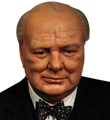Winston Churchill Nobel
|
| updated |
Copy Link Code
|
For Winston Churchill, failure was never an acceptable option. As a young boy he didn't receive very good grades in school, but he didn't let that stop him. Although his poor grades meant he couldn't attend a university, he managed to be accepted into military school, where he excelled. As a young soldier, he became a self-taught scholar, devouring countless numbers of books in his spare time, including the classics and hundreds of books on Parliament. Carrying this love of literature until his death in 1965, Churchill became famous for his knowledge of the written word, his skillful oration, and his incomparable writing ability.
Politically, Churchill is one of the greatest leaders of all time. Even the beginning of his political career saw huge achievements for the British people. From 1908-1910 alone, he was able to successfully mediate a labor dispute, establish a labor exchange – for unemployed people to find jobs – and set a minimum wage for workers. As Home Secretary (1910-1911) he successfully passed the National Insurance Act (the foundation of the modern social welfare system in the UK) as well as the Labor and Shop Acts. While he was First Lord of the Admiralty (the first time around) in 1911-1915, he reorganized the naval staff, converted fleet power from coal to oil, established the Naval Air Corps, and successfully implemented projects for ship and tank development. As Prime Minister (the first time, 1940-1945) he successfully mobilized the English language, and the war efforts with Germany and Italy, as well as Japan were successful.
There were some notable political failures in Churchill's otherwise laudable career. As Secretary of State for Air & War (1919-1921) he failed at Russian intervention. Personally, Churchill felt his greatest mistake came when he restored Britain to the gold standard (while he was Chancellor of the Exchequer, 1924-1929). At the same time, he also failed at sweeping tax reform and mediating a coal strike. When he was First Lord of the Admiralty (the second time around) he also failed at the Norwegian offensive. And as Prime Minister (the second time, 1951-1955) he was unsuccessful in his attempts at Cold War mediation.
As winner of the Nobel Prize, Winston Churchill was an indisputably respected writer. Throughout his entire life and career, he successfully published 43 books in 72 volumes. His six-volume work, The Second World War (published 1948-1953) was more than 5,000 pages of writing – including illustrations such as plans and maps – about the second greatest war in the history of the world. The insightful quality of the work, as well as its accurate and primarily subjective treatment of such an overwhelming topic lead to him being awarded the Nobel Prize for Literature in 1953. This accomplishment was also combined with his skill at oration (speeches) as noted in his Nobel award, "for his mastery of historical and biographical description as well as for brilliant oratory in defending exalted human values."
